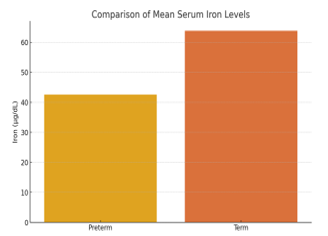Correlation of serum iron, ferritin, and magnesium with preterm labour
Abstract
Preterm labour, defined as the onset of labour before 37 completed weeks of gestation, remains a significant contributor to neonatal morbidity and mortality worldwide. Recent evidence suggests that deficiencies in essential micronutrients such as serum iron, ferritin, and magnesium may play a crucial role in its pathophysiology. This study aims to investigate the correlation between maternal serum levels of iron, ferritin, and magnesium with the occurrence of preterm labour. A cross-sectional case-control study was conducted over six months at a tertiary care hospital, enrolling 100 pregnant women, including 50 with spontaneous preterm labour (28–36+6 weeks) and 50 with term deliveries (≥37 weeks). Blood samples were collected to assess serum iron, ferritin, and magnesium levels using standard biochemical assays. Statistical analysis was performed using SPSS software, employing independent t-tests and Pearson correlation to compare values between groups. Women with preterm labour had significantly lower serum iron, ferritin, and magnesium levels compared to the term group, with significant positive correlations observed between gestational age and these biochemical parameters. This study demonstrates a strong association between lower maternal serum levels of iron, ferritin, and magnesium and the occurrence of preterm labour, highlighting the importance of early screening and supplementation during antenatal care.
Full text article
Generated from XML file
Authors
Kamble, Y. ., Jadhav, S. T. ., & Bagal, N. . (2025). Correlation of serum iron, ferritin, and magnesium with preterm labour. International Journal of Research in Pharmaceutical Sciences, 16(3), 7–13. https://doi.org/10.26452/ijrps.v16i3.4784
Copyright (c) 2025 International Journal of Research in Pharmaceutical Sciences

This work is licensed under a Creative Commons Attribution-NonCommercial-NoDerivatives 4.0 International License.





